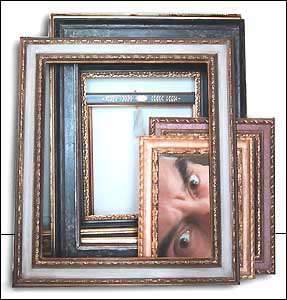| What's in a frame? |

| Are walls really such terrible things as to make a painting need a no man's land if it is to survive? Or is it a remnant from the days when paintings had a status which was barely a notch above that of luxury furniture, and framing them represented a neat way of concealing the frayed edges of the panel or canvas? Or is it, to name but another possibility, a mysterious relic from a period which has vanished without a trace, a bit like windows opening out onto another world, similar to those ruins resembling runways one finds in South America? If it is, this could imply that a frame is a symbol of the ability of the human mind to picture things that are outside our established order. And although this is not necessarily the correct interpretation, it nevertheless comes as a relief to me. |
|
How to explain in a handful of words that devising a simple truth is often a
shockingly time-consuming process ... Jolly convincing as this statement
sounds, it might tempt you to think, "Here we go again, another
semi-intellectual hiding behind cheap sophisms". I learned a long time ago
not to want to go there. After all, nothing is quite as disarming and
revealing as inquiring into the meaning of something. It's a dilemma I spent
many years struggling with, in the mistaken belief that erudition counted as
something praiseworthy. Which of course it does, but not in the way I used
to think. But I digress.
Consider the following proposition if you will: it is most unlikely that everything we currently defend to the hilt will indeed turn out to be true for ever more. Virtually all insights having come to fruition as the history of mankind progressed have duly been invalidated, superseded or simply declared inapplicable. The above happens to be a fallacy. Knowing as we do that the euphoria experienced at the moment of discovery usually rapidly fades into everyday matter-of-factness, the only logical conclusion is that a host of evaporated eurekas are indeed encapsulated in your and my thinking. This helps bring to the fore our ability to condense long-winded hard-won portions of insight into terse phrases which we use as subject matter at some point or other during our youth. It is this mental acceleration power which justifies the hope that we will at some time or other manage to excel ourselves over and over again. Then again, there's always a horizon blocking the landscape beyond at any given time, its mere existence ensuring that the power of human thinking is permanently trivialised. I could compromise by admitting that in the absence of relevant information it comes across as not that unreasonable to assume that we have reached the half-way stage. That should give mankind a leg up. It may be silly, but even the vain deserve the semblance of being right from time to time - after all, the difference in outcome is minute notwithstanding the arithmetic discrepancy, in addition to which every achievement is destined to be reduced to a footnote in some reference work or other and eventually disappear from sight altogether. This should essentially suffice if it weren't for the fact that the indirect proof which I am fond of resorting to will belatedly appeal to your interstellar insight, in that it is quite unlikely that we will not find out a great deal more over the next millenniums, and will doubtless come to the unnerving conclusion that the human brain, which once upon a time emerged from a local fungus, will not achieve any illuminating insight without a little external assistance. What makes this such an engrossing thought is that even from a universal perspective, disproportionate talent - and isn't that what we are all secretly hoping for? - should be a viable option, too. Which is precisely why it is the optimists who have stolen my heart. The obsessions of a few pushing the masses beyond many a border, be it a horrific or a wonderful one. In so far as boundaries subsist, they are merely temporary and arbitrary. Would you object if I declared the above to apply to the visual arts as well? |